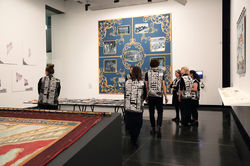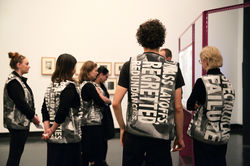

Kay Abude is a multidisciplinary artist based in Melbourne, Australia. Her expanded sculptural practice encompasses large-scale installation, photography, performance, video, and silk screen printing. Abude’s work is about work itself: the value of it, the effort, the inequality and insecurity of it, especially for artists.
Recent commissions include BE CREATIVE REMAIN RESILIENT, Mural Commission, The Showroom, London, UK, 2023–24, and Smoko Room, 2023 Paul Selzer Prize, Fiona and Sidney Myer Gallery, Southbank, 2023.
Abude has been the recipient of numerous grants, including Creative Australia Project Grants in 2025 and 2023, Hume Arts Activity Grants in 2025 and 2022, a City of Melbourne Creative Laneways Project Grant in 2021, and a Play King Foundation Grant at the Australian Tapestry Workshop in 2020. Abude was a studio artist at Gertrude Contemporary, Melbourne, from 2019 to 2022.

Kay Abude
Onshore Production
24 July - 28 October 2018
Digital print on textiles, sewn into work vests and performed by the gallery attendants at The Ian Potter Museum of Art, The University of Melbourne for the exhibition State of the Union, curated by Jacqueline Doughty
Dimensions variable
Kay Abude’s performance-based practice considers factory work and systems of production, often focusing on those who until recently have fallen outside of the advocacy of trade unions - migrant workers, family business employees and market stall holders. When Abude’s own parents moved from the Philippines to Australia in 1986, they made a transition from white collar jobs to factory work – a common migrant experience. As a young child, Abude helped her mother to assemble the electrical components she brought home from work to earn extra income. The artist refers to her family’s experiences in a performance from 2010 called Production Line (Family). Enlisting her mother, father and sister as artistic collaborators, Abude put them to work in the gallery, tasked with cutting sheets of paper into notes the size of $100 bills in a staged action that alluded to the devaluation of repetitive manual labour.
For State of the Union, Kay Abude has researched factory closures in the textile, clothing and footwear industry. In 2009 Pacific Brands announced that it was no longer economically viable to make clothes in Australia, and that they would be taking off-shore the manufacturing of prominent brands such as Bonds and Holeproof. The subsequent factory closures resulted in the loss of 1850 jobs across several states.
Abude has gathered phrases from news stories about the shutdowns and printed them onto fabric: ‘local communities dependant on manufacturing,' ‘It wasn’t just work, you know;’ ‘mass layoffs;’ ‘regretted redundancies.’ During the exhibition, front-of-house museum staff will wear garments made from the fabric. In addition to referencing the dwindling of manufacturing work in Australia, the work also prompts a reflection on the rise of the service economy, particularly jobs which facilitate the leisure of others. In clothing gallery workers, Abude draws attention to their labour as a kind of performance.
______
Written by Jacqueline Doughty, curator of State of the Union at The Ian Potter Museum of Art, The University of Melbourne in July 2018.
 |  |  |  |
|---|---|---|---|
 |  |  |  |
 |  |  |  |
 |  |  |  |
 |